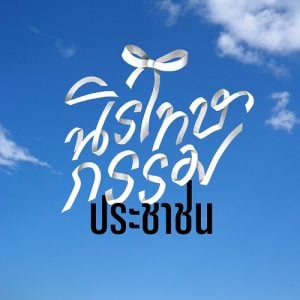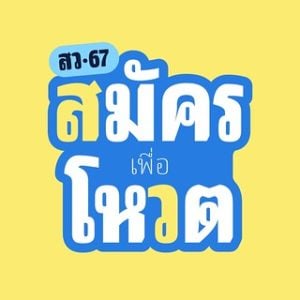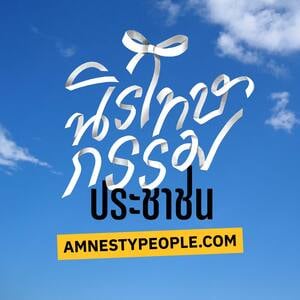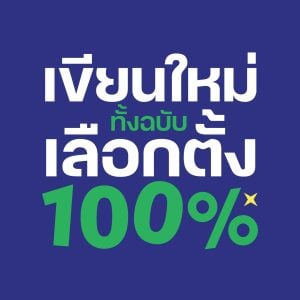The political turmoil since the 2006 coup d’état has resulted in numerous political movements. These include the demonstration in 2006, the rallies by Red Shirts from 2009 to 2010, the protests against the coup d’état in 2014, and even those political assemblies since 2020. As it turned out, the government burdened people who exercised their rights to assembly and expression with legal cases.
These situations have led to a public debate regarding the necessity of an amnesty. In this regard, the People’s Amnesty Network, a coalition of civil society and activists across Thailand, has proposed The Amnesty for People Bill to end all the politically motivated prosecution and the pending legal cases related to political expression.
An immediate amnesty for all parties starting from 2006
The Amnesty for People Draft Bill, B.E. … (the Amnesty Act) offers amnesty to all parties participating in the political assembly since 19 September 2006, the date in which the military orchestrated a coup d’état. Any actions related to political expressions fall within the scope of this Bill. The types of cases that will be granted amnesty can be found in the section 5 of the Bill, which include:
- Cases related to announcements and regulations of the National Council for Peace and Order (NCPO) or orders from the Head of the NCPO.
- Cases in which civilians were prosecuted under the military court’s jurisdiction according to the issued announcement no. 37/2014 (B.E.2557) and no. 38/2014 (B.E.2557) of the NCPO.
- Cases related to the offences under section 112 of the Thai Penal Code (Lèse-majesté law)
- Cases related to the offences as specified in the Emergency Decree on Government Administration in States of Emergency, 2005 (B.E. 2548)
- Cases related to the offences specified in the Constitutional Referendum Act, 2016 (B.E. 2559)
- Cases related to any offences as mentioned above.
Excluding government officers and coup orchrestrators
Nevertheless, not everyone will be granted amnesty. Section 4 of the Amnesty Bill does not grant the amnesty to the government officers who cracked down on the protest or did any excessive action or the offence under section 113 of the Thai Penal Code, which is the offence of treason. This offence includes the offence of overthrowing the constitution, legislative power, executive power, or judicial power, separating the kingdom or seizing the administrative power. In short, the coup orchestrators will be exempted from the amnesty.
Most Amnesty Bills in Thai history would “include” government officers in the Amnesty Bill. However, the current Amnesty Bill excludes government officers, which sets it apart from its predecessors.
The Amnesty Committee, with representation from civilian and civil society
The Amnesty for People Bill also asserts to appoint 19 people to be the Amnesty Committee as a mechanism to steer the amnesty, including:
- Speaker of the House of Representatives as the Chairperson of the Committee,
- Leader of the opposition,
- Chairperson of the Coalition Government Coordination Committee,
- 10 Members of the House of Representatives in accordance with the proportionality of the House of Representatives,
- A representative from the people being prosecuted in 4 incidents: the 2006 coup d’état, the 2009-2010 protests, the 2014-2019 coup d’état, and the 2020-2023 protests, and
- 2 members from the public sector organizations working to investigate the truth and seek justice.
The Committee to consider the remaining amnesty cases and submit reports on remedial offerings.
Apart from cases that are automatically granted amnesty under section 5 of the Amnesty for People Bill, the Committee is authorised under this Bill to grant the amnesty for other cases should the Committee deems that the action is related to the protest or political expression.
Furthermore, the Bill allows people other than the accused to request the Committee for amnesty consideration. Such people include the offender or husband, wife, ascendants, descendants, cohabitants as husband and wife, dependents, or benefactor of the offender to file a petition to the Committee to consider if there cases all into the scope of political expression, and hence is entitled to the amnesty. This gives an opportunity for the remaining cases to be considered.
After the enforcement of the Amnesty Bill, cases eligible for amnesty through the law or the Committee will be ceased by suspending any lawsuit if it has not been filed. The lawsuit must be withdrawn or withheld if it has already been filed. The case will be dismissed or disposed of if it is being considered in court. If it is in the process of punishment, the punishment shall end and that person shall be released immediately. Under the supervision of the Committee, the Royal Thai Police will erase their criminal record.
Thereafter, another duty of the Committee is to prepare a report to offer remedial measures to those affected after the amnesty.
However, this Bill grants amnesty only for criminal cases. It does not deprive the injured person of the right to file a civil lawsuit against those involved in the said political case if an injury is caused in a civil matter.
The Amnesty Bill was publicly introduced on 19 November 2566, which is the third anniversary of the reenforcement of section 112 of the Thai Penal Code. According to the 2017 Constitution, with at least 10,000 signatures, Thai citizens have the right to send a draft bill to the parliament for consideration. The aim of the People’s Amnesty Network is to gather all the signatures by 14 February 2024 and submit the draft bill along with other presented by political parties.


















